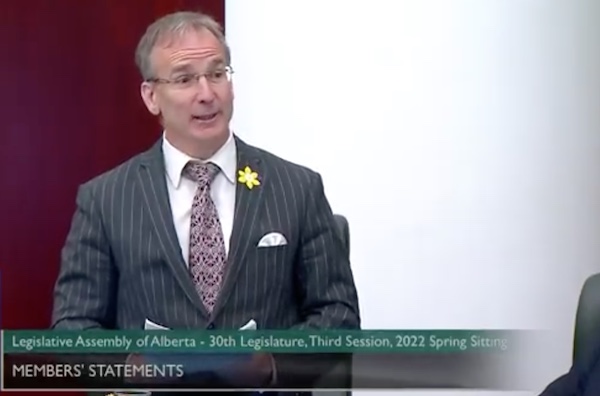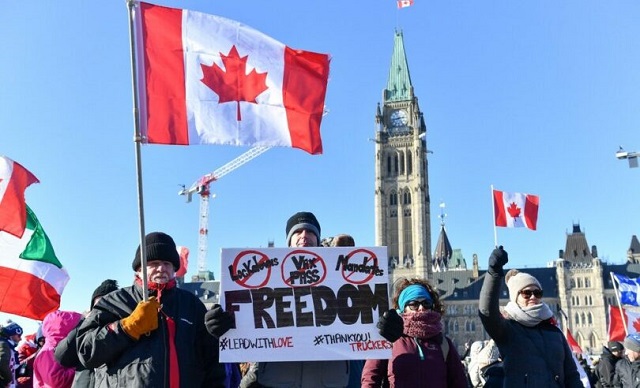Alberta
It’s time for the Alberta Sovereignty Act – Red Deer South MLA Jason Stephan

This article submitted by Red Deer South MLA Jason Stephan
THE ALBERTA SOVEREIGNTY ACT IS GOOD FOR ALBERTA
I supported the concept of the Alberta Sovereignty Act before the UCP leadership race. It was developed by the Free Alberta Strategy. I participated in their townhalls supporting their strategies, as did two of the UCP leadership candidates, Danielle Smith and Todd Loewen. Jason Kenney and his cabinet ministers did not.
What is the Alberta Sovereignty Act?
The Sovereignty Act affirms Alberta’s right to refuse and reject Federal Government actions or laws that intrude into provincial areas of jurisdiction or attack the interests of Alberta.
Ottawa recently released a “discussion paper” seeking to limit, or impose additional carbon taxes on, oil and gas development. This is not an isolated incident; this is a pattern of hostile behavior from Ottawa seeking to attack and take advantage of Alberta, holding it back.
Albertans should be aware that this discussion paper is likely a pretext, an excuse to either take more money from Alberta or prevent it from excelling ahead of other provinces.
Albertans should be aware that at any time Ottawa may leverage the Supreme Court of Canada decision permitting carbon taxes, overruling our Court of Appeal describing Ottawa’s carbon taxes as a “constitutional trojan horse”, to impose a targeted windfall or carbon tax on Alberta’s natural resources that discriminates and disproportionately punishes Alberta while sparing Ontario and Quebec from burden or harm.
The Supreme Court of Canada says carbon taxes are a tool that Ottawa has its disposal at any time to punish Alberta, yet under section 92A of the Constitution Act, Alberta has jurisdiction over its natural resources, not Ottawa.
The Alberta Sovereignty Act should be invoked to reject the “discussion paper” and tell Ottawa to leave Alberta and its constitutional jurisdiction alone.
The unfortunate truth is that Ottawa has made itself an unpredictable and hostile variable, a threat to the freedom and prosperity of Alberta businesses and families that should not be underestimated.
Alberta is compelled to protect itself.
Does the Establishment like the Alberta Sovereignty Act? No. Many Eastern politicians and their media pundits do not like the Alberta Sovereignty Act. It challenges the status quo they benefit under.
Their status quo has enabled a pattern of abuse and economic warfare on Alberta, disrespecting its jurisdiction over its resources, creating chaos and injecting commercial uncertainty, chasing away billions in private sector investments and thousands of Alberta jobs.
Albertans are becoming more aware that this is a rigged partnership. Alberta businesses and families give hundreds of millions more to Ottawa than they receive in return, with Ottawa using our money, not to benefit Alberta, but for political gain, primarily in Quebec, the structural welfare recipient under the partnership. Equalization is one of the devices that Ottawa uses for this purpose.
Albertans want change. Alberta held an equalization referendum. Ottawa ignored the result –to them Alberta is means to an end, they want our money. Strongly worded letters from Alberta politicians have accomplished nothing. It is time for less words and more actions.
Boundaries are reasonable and normal.
Boundaries are integral to adult relationships. The Alberta Sovereignty Act seeks to impose boundaries that Ottawa continually disrespects, to discriminate, attack, and force itself into Alberta’s constitutional jurisdictions.
Some of the UCP leadership candidates say the Alberta Sovereignty Act will produce chaos. They are wrong. It is a morally and fiscally bankrupt Ottawa, a trillion dollar plus fiscal train wreck, that is producing chaos. Ottawa is the risk that we can no longer afford, not a law that seeks to do something about it!
The Alberta Sovereignty Act is good for Alberta. Wisely applied it can help protect the Alberta Advantage, as the most attractive Canadian jurisdiction to start and grow a business, to work and raise our families. Alberta is a land of freedom and opportunity for us and our children. We must be vigilant to keep it that way.
The deadline to become a member of the United Conservative Party to vote in this leadership race is this Friday, August 12. We invite all Alberta conservatives to become a member of the party, to vote and have your say on who will be the next leader and Premier of Alberta!
You can buy a membership here, or check if your membership is up-to-date here.
Alberta
Maxime Bernier says it’s ‘astounding’ Alberta is ‘pushing’ COVID boosters, tells Danielle Smith to stop it

From LifeSiteNews
The People’s Party of Canada leader tells the Alberta government: ‘It’s over! Get over it!’
People’s Party of Canada (PPC) leader Maxime Bernier said Alberta Premier Danielle Smith should tell provincial health bureaucrats to “back off” and stop “pushing” the mRNA COVID boosters on “anyone,” considering a recent announcement from health officials recommending yet more COVID shots.
“I find it astounding that Alberta public health bureaucrats are still pushing the mRNA boosters on anyone, and especially on children who have never been at risk, almost two years after almost all other pandemic measures have been ended,” Bernier told LifeSiteNews.
“Danielle Smith’s government should tell its bureaucrats to back off and stop stupidly feeding a needless sense of fear surrounding the virus that lingers among certain groups of society. It’s over! Get over it!”
Earlier this week, officials from Alberta Health Services (AHS), whose chief medical officer throughout the COVID crisis, Dr. Deena Hinshaw, was fired by Smith in 2022, updated its COVID booster recommendations to every “three months” starting at babies only six months old.
“Starting April 15, 2024, select groups of Albertans at high risk of severe outcomes from COVID-19 will be eligible for an additional dose,” the AHS noted on its website.
AHS health officials still assert that all “vaccines are safe, effective and save lives,” and that one can get a COVID shot at the same time as a flu vaccine.
On April 16, Bernier commented on the AHS’s new COVID jab guideline changes on X, in which he asked, “What’s going on in Alberta with their “conservative” government?
Bernier, who was a firm opponent of both the COVID shots and mandates, told LifeSiteNews that AHS’s recommendations are puzzling, given “more and more scientific evidence is emerging of dangerous side effects when injecting from these experimental substances.”
“Even though these are only recommendations, and nothing is mandated, this ‘guidance’ by government agencies influences people’s decisions,” Bernier said.
AHS claims that the booster shots “are anticipated to provide a good immune response against currently circulating strains.”
Those under 18 still need written or verbal consent from their parents to get the shot.
AHS is recommending booster jabs for seniors, healthcare workers as well as those with underlying medical conditions. They also recommend that First Nations people and “members of racialized and other equity-denied communities,” as well as pregnant women get the shots as well.
The COVID shots were heavily promoted by the federal government as well as all provincial governments in Canada, with the Alberta government under former Premier Jason Kenney being no exception.
The mRNA shots themselves have been linked to a multitude of negative and often severe side effects in children.
Danielle Smith took over from Kenney as leader of the United Conservative Party (UCP) on October 11, 2022, after winning the leadership. Kenney was ousted due to low approval ratings and for reneging on promises not to lock Alberta down as well as enacting a vaccine passport. Smith was opposed to COVID jab mandates.
Bernier: It’s ‘deplorable’ some provinces still mandate COVID shot for Heathcare workers
While Alberta does not mandate the COVID shots for healthcare workers anymore, British Columbia still does as well as some health regions in Ontario, a fact that Bernier called “deplorable.”
“I find it deplorable that nurses, doctors and other healthcare workers in B.C. and Ontario still have to be vaccinated to work in hospitals and that thousands of them have not been reintegrated,” Bernier told LifeSiteNews.
“The authoritarian covid measures adopted by all governments have been traumatic enough for millions of Canadians. All of them should be lifted.”
Last year, LifeSiteNews reported on how the details of the Canadian federal government’s COVID-19 vaccine contract with Pfizer for millions of doses of the mRNA-based experimental shots were recently disclosed after being hidden for over three years.
The contract with Pfizer shows the government agreed to accept the unknown long-term safety and efficacy of the shots. The details of the Pfizer contract do not disclose how much the government spent on the jabs.
A bill introduced by Conservative Party leader Pierre Poilievre that would have given Canadians back their “bodily autonomy” by banning future jab mandates was voted down last year after Trudeau’s Liberals and other parties rejected it.
Adverse effects from the first round of COVID shots have resulted in a growing number of Canadians filing for financial compensation over injuries from the jabs via the federal Vaccine Injury Program (VISP).
VISP has already paid well over $11 million to those injured by COVID injections.
Earlier this year, LifeSiteNews reported on how officials from Health Canada have admitted that there is “residual plasmid DNA” in the COVID shots after a Conservative MP asked the agency through an official information request if the DNA fragments were in the shots.
As for Bernier, earlier this month he called out Poilievre for dodging a question regarding Canada’s participation in the United Nations’ pro-abortion Paris Climate Agreement.
Throughout most of the COVID crisis, Canadians from coast to coast were faced with COVID mandates, including jab dictates, put in place by both the provincial and federal governments.
After much pushback, thanks to the Freedom Convoy, most provincial mandates were eliminated by the summer of 2022.
There are currently multiple ongoing class-action lawsuits filed by Canadians adversely affected by COVID mandates.
Alberta
Canada’s advantage as the world’s demand for plastic continues to grow

From the Canadian Energy Centre
By Will Gibson
‘The demand for plastics reflects how essential they are in our lives’
From the clothes on your back to the containers for household products to the pipes and insulation in your home, plastics are interwoven into the fabric of day-to-day life for most Canadians.
And that reliance is projected to grow both in Canada and around the world in the next three decades
The Global Plastics Outlook, published by the Paris-based Organization for Economic Co-operation and Development (OECD), forecasts the use of plastics globally will nearly triple by 2060, driven by economic and population growth.
The use of plastics is projected to double in OECD countries like Canada, the United States and European nations, but the largest increases will take place in Asia and Africa.
“The demand for plastics reflects how essential they are in our lives, whether it is packaging, textiles, building materials or medical equipment,” says Christa Seaman, vice-president, plastics with the Chemical Industry Association of Canada (CIAC), which represents Canada’s plastics producers.
She says as countries look to meet climate and sustainability goals, demand for plastic will grow.
“Plastics in the market today demonstrate their value to our society. Plastics are used to make critical components for solar panels and wind turbines. But they also can play a role in reducing weight in transportation or in ensuring goods that are transported have less weight in their packaging or in their products.”
Canada produces about $35 billion worth of plastic resin and plastic products per year, or over five per cent of Canadian manufacturing sales, according to a 2019 report published by the federal government.
Seaman says Canadian plastic producers have competitive advantages that position them to grow as demand rises at home and abroad. In Alberta, a key opportunity is the abundant supply of natural gas used to make plastic resin.
“As industry and consumer expectations shift for production to reduce emissions, Canada, and particularly Alberta, are extremely well placed to meet increased demand thanks to its supply of low-carbon feedstock. Going forward, production with less emissions is going to be important for companies,” Seaman says.
“You can see that with Dow Chemical’s decision to spend $8.8 billion on a net zero facility in Alberta.”
While modern life would not be possible without plastics, the CIAC says there needs to be better post-use management of plastic products including advanced recycling, or a so-called “circular economy” where plastics are seen as a resource or feedstock for new products, not a waste.
Some companies have already started making significant investments to generate recyclable plastics.
For example, Inter Pipeline Ltd.’s $4.3 billion Heartland Petrochemical Complex near Edmonton started operating in 2023. It produces a recyclable plastic called polypropylene from propane, with 65 per cent lower emissions than the global average thanks to the facility’s integrated design.
Achieving a circular economy – where 90 per cent of post-consumer plastic waste is diverted or recycled – would benefit Canada’s economy, according to the CIAC.
A Deloitte study, commissioned by Environment & Climate Change Canada, estimated diverting or reusing 90 per cent of post-consumer plastic waste by 2030 will save $500 million annually while creating 42,000 direct and indirect jobs. It would also cut Canada’s annual CO2 emissions by 1.8 megatonnes.
Right now, about 85 per cent of plastics end up in Canada’s landfills. To reach the 90 per cent diversion rate, Seaman says Canada must improve its infrastructure to collect and process the plastic waste currently being landfilled.
But she also says the industry rather than municipalities need to take responsibility for recycling plastic waste.
“This concept is referred to as extended producer responsibility. Municipalities have the responsibility for managing recycling within a waste management system. Given the competing costs and priorities, they don’t have the incentive to invest into recycling infrastructure when landfill space was the most cost-effective solution for them,” she says.
“Putting that responsibility on the producers who put the products on the market makes the most sense…The industry is adapting, and we hope government policy will recognize this opportunity for Canada to meet our climate goals while growing our economy.”
-

 Economy1 day ago
Economy1 day agoExtreme Weather and Climate Change
-

 International1 day ago
International1 day agoTelegram founder tells Tucker Carlson that US intel agents tried to spy on user messages
-

 Alberta2 days ago
Alberta2 days agoDanielle Smith warns arsonists who start wildfires in Alberta that they will be held accountable
-

 National2 days ago
National2 days agoCanada’s Governor General slammed for hosting partisan event promoting Trudeau’s ‘hate speech’ bill
-

 Business1 day ago
Business1 day agoNew capital gains hike won’t work as claimed but will harm the economy
-

 Bruce Dowbiggin1 day ago
Bruce Dowbiggin1 day agoWhy Are Canadian Mayors So Far Left And Out Of Touch?
-

 Justice1 day ago
Justice1 day agoOntario Court of Justice says participants must state their ‘preferred pronouns’ during introduction
-

 Business1 day ago
Business1 day agoTrudeau gov’t pledges $42 million to the CBC to promote ‘independent journalism’






